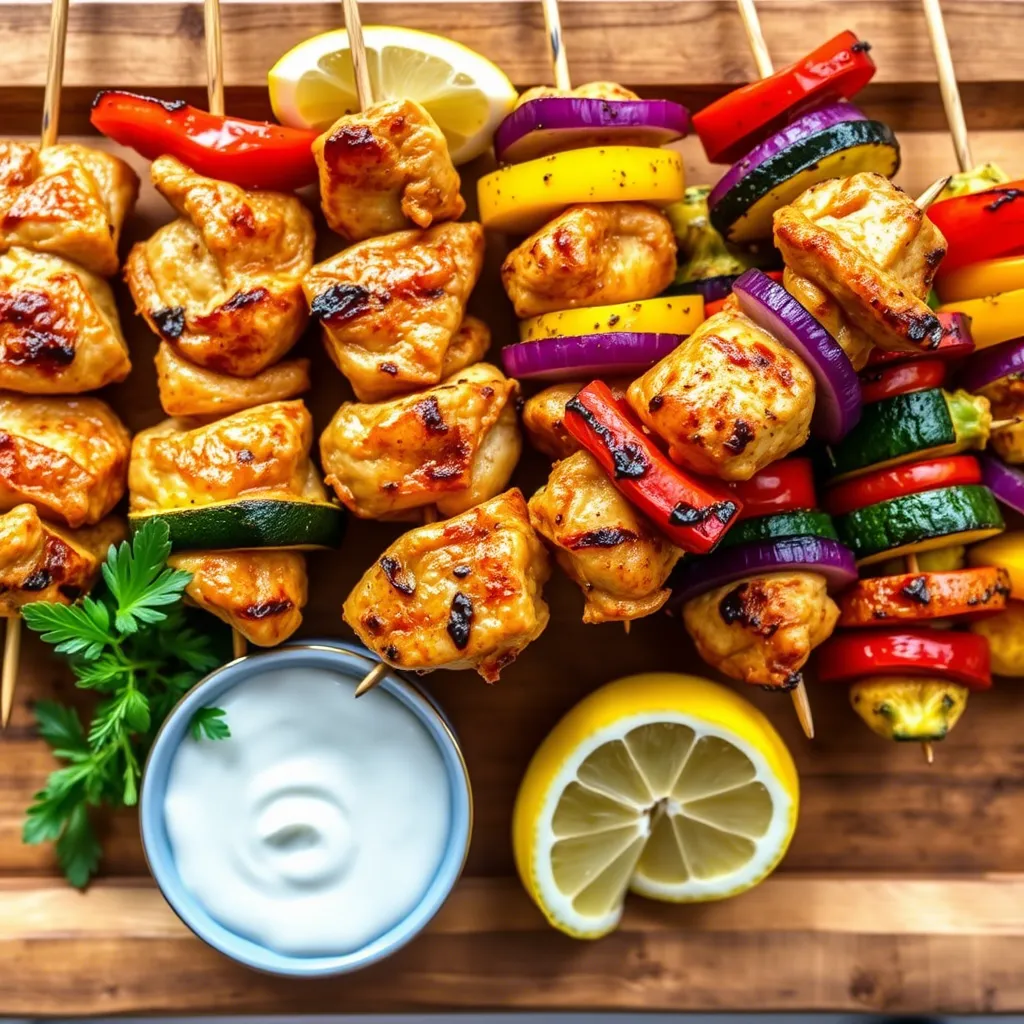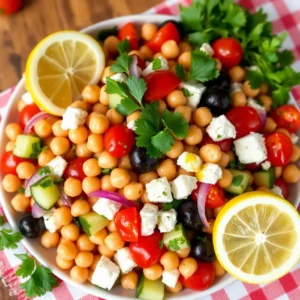Why You’ll Love These Lemon Herb Grilled Chicken and Vegetable Skewers
There’s something magical about the sizzle of lemon herb chicken hitting a hot grill on a warm spring evening. The tantalizing aroma of herbs and citrus wafting through the air signals the official start of barbecue season, and these grilled skewers are about to become your new warm-weather obsession.
As a busy mom or working professional, I understand the dinner dilemma all too well. You want something delicious and impressive, but who has hours to spend in the kitchen? That’s exactly why these lemon herb grilled chicken and vegetable skewers have become a staple in my household. With just 20 minutes of prep time and 15 minutes on the grill, you’ll have a complete meal that looks like you spent all day preparing it.
The beauty of these skewers is their incredible versatility. Serving picky eaters? Let everyone customize their own skewers with their favorite vegetables. Need a crowd-pleasing appetizer for your spring barbecue? These colorful skewers will disappear before you can say “seconds, please!” Trying to eat healthier without sacrificing flavor? These protein-packed, veggie-loaded delights are as nutritious as they are delicious.
The marinade is where the magic happens – a bright, herbaceous blend that infuses the chicken with mouthwatering flavor while keeping it incredibly tender and juicy. No more dry, bland chicken on your watch! The lemon adds a sunny brightness that perfectly balances the earthiness of the herbs, creating a flavor profile that’s sophisticated yet approachable.
What really sets these skewers apart is how they transform ordinary ingredients into something extraordinary. That package of chicken breasts sitting in your fridge? Those vegetables threatening to wilt in your crisper drawer? With this recipe, they’ll become a feast worthy of a celebration. It’s kitchen alchemy at its finest, and you get to be the wizard.
The presentation alone makes these skewers worth adding to your recipe collection. There’s something undeniably appealing about food on a stick – it’s fun, interactive, and visually stunning with all those vibrant colors lined up in neat rows. Even my teenager, who typically approaches vegetables with suspicion worthy of a crime scene investigator, will happily devour these skewers without a single complaint.
And let’s talk about the flexibility factor. These skewers work beautifully as a main course served over fluffy rice or alongside a crisp salad. They’re perfect for meal prep – make a big batch on Sunday, and you’ve got protein-packed lunches sorted for days. They even work as a hearty appetizer for your next gathering. Talk about getting more bang for your cooking buck!
The Story Behind These Lemon Herb Grilled Chicken and Vegetable Skewers
My journey with these lemon herb grilled chicken skewers began on a warm spring evening much like today. After a particularly grueling week of deadlines and after-school activities, the thought of cooking an elaborate meal made me want to curl up in the pantry with a bag of chips and call it dinner. But as luck would have it, I had promised my family a proper meal, and I’m nothing if not a man of my word (even when that word is given to a seven-year-old with suspicious negotiation skills).
Standing in my kitchen, staring blankly into the refrigerator like it might suddenly reveal the secrets of the universe (or at least dinner), I spotted some chicken breasts, a lemon on its last legs, and an assortment of vegetables that had seen better days. In that moment of culinary desperation, these skewers were born.
I’ve always believed that simple food made with love beats complicated cuisine any day of the week. Growing up, my grandmother could transform the humblest ingredients into feasts that would bring the family running to the table. “Food doesn’t need to be fancy to be special,” she’d say, wielding her wooden spoon like a magic wand. This philosophy has guided my cooking ever since, especially on those days when time is as scarce as matching socks in a laundry basket.
The first time I served these skewers, something miraculous happened – complete silence at the dinner table. If you have children, you know this isn’t the ominous silence of rejection, but the reverent quiet of genuine enjoyment. My usually chatty daughter was too busy savoring each bite to share the day’s playground politics. My son, who typically approaches new foods with the caution of someone disarming explosives, asked for seconds. Even my wife, whose polite “it’s interesting” is her diplomatic code for “never make this again,” was genuinely enthusiastic.
Since that evening, these skewers have become somewhat legendary in our household. They’re requested for birthdays, served at summer barbecues, and have even made appearances at neighborhood gatherings where I’ve had to scribble the recipe on napkins more times than I can count. If I wanted to maintain my “culinary genius” status, I should probably keep this recipe to myself, but food this good deserves to be shared.
What I love most about this recipe is how it connects us to the changing seasons. In the depths of winter, when we’re bundled under blankets and the grill is hibernating under a tarp, my kids will occasionally ask, “How many more days until skewer season, Dad?” It’s become our family’s unofficial marker of spring – that first evening when the air is warm enough to fire up the grill and thread these colorful ingredients onto skewers.
For an equally vibrant and delicious addition to your spring barbecue menu, you might want to try pairing these skewers with my refreshing cucumber tomato salad. The cool, crisp vegetables provide the perfect counterpoint to the warm, herb-infused skewers.
Ingredients
The beauty of these lemon herb grilled chicken and vegetable skewers lies in their simple yet flavorful ingredients. Each component plays a crucial role in creating that perfect balance of bright, herbaceous flavors that make this dish shine. Let’s break it down:
For the Chicken and Vegetables:
- 2 pounds boneless, skinless chicken breasts, cut into 1½-inch cubes
- 2 bell peppers (preferably different colors for visual appeal), cut into 1½-inch pieces
- 1 large red onion, cut into 1½-inch chunks
- 2 medium zucchini, sliced into ½-inch rounds
- 1 pint cherry tomatoes
- 8-10 wooden or metal skewers (if using wooden, soak in water for at least 30 minutes before grilling)
The chicken is the star protein here, providing a perfect canvas for our flavorful marinade. I recommend using chicken breasts for their lean profile and how beautifully they absorb flavors, but boneless thighs work wonderfully too if you prefer juicier, more forgiving meat. Just make sure to cut the pieces uniformly – about 1½ inches is perfect for cooking evenly while staying juicy.
For the vegetables, I’ve suggested a classic combination that grills beautifully, but this is where you can really make the recipe your own. Yellow squash works just as well as zucchini. Mushrooms (especially cremini or baby portobello) add a wonderful earthiness. Even chunks of par-boiled new potatoes can be delicious additions. The key is choosing vegetables that can stand up to the heat of the grill without turning to mush.
For the Lemon Herb Marinade:
- Zest and juice of 2 lemons (about ¼ cup juice)
- ⅓ cup extra virgin olive oil
- 4 garlic cloves, minced
- 2 tablespoons fresh oregano, chopped (or 2 teaspoons dried)
- 2 tablespoons fresh thyme leaves (or 2 teaspoons dried)
- 2 tablespoons fresh rosemary, chopped (or 2 teaspoons dried)
- 2 tablespoons fresh parsley, chopped
- 1 tablespoon honey
- 1 teaspoon Dijon mustard
- 1 teaspoon kosher salt
- ½ teaspoon freshly ground black pepper
- ¼ teaspoon red pepper flakes (optional, for heat)
Fresh herbs truly elevate these skewers to something special, but I understand that not everyone has an herb garden at their disposal. If you’re using dried herbs, remember the general rule: use one-third the amount called for fresh. Dried herbs have a more concentrated flavor, so a little goes a long way.
The lemon components – both zest and juice – are non-negotiable here. The zest contains the fragrant oils that give that distinctive bright flavor, while the juice adds acidity that helps tenderize the chicken. If you’re in a pinch, bottled lemon juice will work, but you’ll miss out on the aromatic complexity that fresh lemon zest provides.
Honey might seem like an unusual addition, but it serves multiple purposes: it balances the acidity of the lemon, helps the marinade adhere to the chicken and vegetables, and promotes beautiful caramelization on the grill. The Dijon mustard acts as an emulsifier, keeping the oil and lemon juice happily combined while adding a subtle depth of flavor.
For Serving (Optional):
- Extra lemon wedges
- ¼ cup fresh parsley, chopped
- Tzatziki sauce or Greek yogurt for dipping
- Warm pita bread
According to the experts at Food Network, having a few simple accompaniments can transform grilled dishes from a mere meal component to a complete dining experience. I couldn’t agree more – sometimes those finishing touches make all the difference.
Execution
Now that we’ve gathered our ingredients, let’s dive into the step-by-step process for creating these mouthwatering lemon herb grilled chicken and vegetable skewers:
Step 1: Prepare the Marinade (5 minutes) In a medium bowl, combine the lemon zest, lemon juice, olive oil, minced garlic, oregano, thyme, rosemary, parsley, honey, Dijon mustard, salt, pepper, and red pepper flakes if using. Whisk vigorously until well combined and the honey is fully incorporated. The marinade should look like a cohesive, slightly thickened mixture rather than separated oil and lemon juice. Take a moment to dip your pinky in for a taste – it should have a bright, vibrant flavor with no single ingredient overwhelming the others.
Step 2: Prepare the Chicken and Vegetables (15 minutes) Cut the chicken breasts into approximately 1½-inch cubes, trying to keep the pieces as uniform as possible for even cooking. Pat the chicken dry with paper towels – this helps the marinade adhere better. Place the chicken in a large zip-top bag or glass container.
Prepare your vegetables: cut bell peppers into chunks roughly the same size as your chicken pieces, slice zucchini into ½-inch rounds, and separate red onion into 1½-inch chunks, keeping the layers together where possible. Cherry tomatoes can remain whole. Place the vegetables in a separate large zip-top bag or container.
Step 3: Marinate (30 minutes to 4 hours) Pour about two-thirds of the marinade over the chicken, seal the bag or container, and massage gently to ensure all pieces are well coated. Pour the remaining third of the marinade over the vegetables and toss gently to coat.
Allow the chicken to marinate in the refrigerator for at least 30 minutes, but no more than 4 hours. The vegetables need only about 15-30 minutes of marinating time. If you marinate too long, the acidity in the lemon juice can start to “cook” the chicken (similar to ceviche) and break down the vegetables, resulting in mushy textures.
Step 4: Prepare for Grilling (5 minutes) If using wooden skewers, make sure they’ve been soaking in water for at least 30 minutes to prevent burning. Preheat your grill to medium-high heat (around 375-400°F).
Remove the chicken and vegetables from the refrigerator about 15 minutes before grilling to take the chill off – this helps promote even cooking. Discard any remaining marinade that has been in contact with the raw chicken.
Step 5: Assemble the Skewers (10 minutes) Thread the marinated chicken pieces and vegetables onto skewers, alternating for a colorful presentation. Leave a small space between pieces to ensure even cooking. A good pattern might be: chicken, bell pepper, onion, zucchini, tomato, then repeat.
For the most successful skewers, try to group similar items together on specialized skewers, as suggested by Serious Eats. This allows for more precise cooking control since different ingredients cook at different rates. However, if you’re aiming for those Instagram-worthy rainbow skewers, just be vigilant about cooking times.
Step 6: Grill the Skewers (12-15 minutes) Place the skewers on the preheated grill, making sure they’re perpendicular to the grates to prevent smaller ingredients from falling through. Close the lid and grill for 4-5 minutes without disturbing them – this allows those beautiful grill marks to form and the flavors to begin developing.
Flip the skewers and continue grilling for another 4-5 minutes. Check for doneness by cutting into a larger piece of chicken – it should be opaque throughout with no pink remaining, or register 165°F on an instant-read thermometer. If you’ve opted for separate vegetable skewers, they may finish a few minutes before the chicken.
If you notice the vegetables charring too quickly while the chicken needs more time, move the skewers to a cooler part of the grill or adjust your arrangement for the next batch.
Step 7: Rest and Serve (5 minutes) Transfer the cooked skewers to a clean platter and let them rest for about 5 minutes. This allows the juices to redistribute throughout the chicken, ensuring maximum tenderness and flavor.
While resting, sprinkle with additional fresh parsley and arrange lemon wedges around the platter for serving. If you’re offering tzatziki or Greek yogurt for dipping, transfer it to a small bowl and place it alongside the skewers.
The entire active cooking process takes about 35 minutes, perfect for those busy weeknights when you need a delicious meal without spending hours in the kitchen. For another quick and flavorful option that complements these skewers beautifully, consider trying my cilantro lime rice recipe as a side dish.
Additional Tips
The beauty of these lemon herb grilled chicken and vegetable skewers lies not just in their deliciousness but also in their incredible adaptability. Let me share some of my hard-earned wisdom to help you make these skewers truly your own and avoid any potential pitfalls along the way.
Marinating Magic While the recipe calls for a minimum of 30 minutes of marinating time, I find that 2 hours hits the sweet spot for flavor infusion without compromising texture. However, if you’re in a genuine time crunch, even 15 minutes will impart some lovely flavor. Just be sure to keep the chicken pieces small enough to maximize surface area contact with the marinade.
For maximum flavor penetration, consider using a fork to poke a few holes in your chicken pieces before marinating. These tiny channels allow the marinade to work its way deeper into the meat, resulting in more flavorful bites from the inside out.
Skewer Strategy The eternal question: metal or wooden skewers? Both have their merits. Metal skewers conduct heat, helping to cook the chicken from the inside as well as the outside. They’re also reusable and environmentally friendly. Wooden skewers, on the other hand, don’t get hot to the touch, making them more manageable for serving directly to guests, especially children.
If you opt for wooden skewers, consider this pro tip: After soaking, wrap the exposed ends with small pieces of aluminum foil. This prevents the tips from burning while still allowing the covered portions to cook your food perfectly.
For easier turning on the grill, use two parallel skewers for each kebab instead of just one. This prevents the food from spinning when you try to flip them, keeping your perfectly arranged pattern intact and ensuring even cooking on all sides.
Vegetable Variations While the recipe specifies certain vegetables, seasonal substitutions can take these skewers to new heights. In late summer, chunks of corn on the cob make a sweet, charred addition. Spring brings tender asparagus spears that cook quickly and add elegant flair. Fall beckons with chunks of butternut squash (pre-roast these slightly before skewering for proper doneness).
For vegetables with different cooking times, consider creating separate skewers by ingredient type rather than mixing everything together. This allows you to remove quicker-cooking items like tomatoes before they become too soft, while giving denser vegetables like bell peppers the additional time they need.
Storage and Reheating These skewers are excellent for meal prep. Once cooked, they’ll keep well in the refrigerator for up to 3 days in an airtight container. To reheat without drying out the chicken, place them in a covered baking dish with a tablespoon of water, and warm in a 300°F oven for about 15 minutes.
For freezing pre-marinated but uncooked skewers, lay them flat on a parchment-lined baking sheet and freeze until solid, then transfer to freezer bags. They’ll keep for up to 3 months. Thaw completely in the refrigerator before grilling.
Serving Suggestions These versatile skewers pair beautifully with a variety of sides. For a Mediterranean feast, serve them with warm pita, hummus, tzatziki, and a simple Greek salad. For a heartier meal, consider perfectly roasted golden potatoes as a satisfying accompaniment.
For a fun interactive dinner party, set up a “skewer bar” with pre-grilled chicken and vegetables alongside empty skewers, allowing guests to create their own combinations. Include a variety of dipping sauces like tzatziki, chimichurri, or even a simple herbed Greek yogurt for added dimension.
Troubleshooting If your chicken seems to dry out on the grill, you might be cooking at too high a temperature. Keep the heat at medium-high rather than high, and consider using chicken thighs instead of breasts for more forgiving, juicier results.
For those who find their vegetables charring before the chicken is cooked through, try par-cooking denser vegetables briefly before marinating and skewering. A quick 1-2 minute blanch for items like bell peppers or broccoli can help everything finish cooking simultaneously.
According to Epicurious, one of the biggest mistakes people make with skewers is overcrowding them. Resist the temptation to pack ingredients too tightly – each piece needs a bit of space around it to cook evenly and develop those delicious charred edges.
FAQs
Can I make these skewers in the oven instead of on a grill? Absolutely! While you’ll miss some of that distinctive charred flavor, these lemon herb chicken and vegetable skewers adapt beautifully to oven cooking. Preheat your oven to 425°F and place the assembled skewers on a large, rimmed baking sheet. Cook for about 20-25 minutes, turning halfway through, until the chicken reaches 165°F internally. For a finishing touch that mimics grill marks, you can broil them for the last 2-3 minutes, watching carefully to prevent burning.
How do I prevent my wooden skewers from burning on the grill? The key to preventing wooden skewer burnout is thorough soaking – give them at least 30 minutes submerged in water before threading on your ingredients. For even better protection, soak them overnight in the refrigerator. Another effective strategy is wrapping the exposed ends with small pieces of aluminum foil, creating a heat shield while leaving the food-bearing portions uncovered. Some grill masters even keep a spray bottle of water handy to dampen any areas that begin to smoke excessively.
My marinade solidified in the refrigerator. Is that normal? This is perfectly normal and nothing to worry about! The olive oil in the marinade can solidify when chilled, creating a slightly congealed appearance. Simply let the marinade sit at room temperature for about 15 minutes before using, or microwave it for 5-10 seconds (not longer, as you don’t want to cook the garlic or herbs) and whisk again to recombine. The marinade will return to its liquid state and work exactly as intended.
Can I prep these skewers ahead of time for a party? Absolutely – these grilled skewers are perfect for advance preparation. You have a few options: marinate the chicken and vegetables separately up to 4 hours before cooking, or assemble the raw skewers completely and refrigerate them (covered) for up to 8 hours before grilling. For the ultimate convenience, you can even grill them entirely ahead of time, refrigerate, and then give them a quick 5-minute reheat on the grill or in a 350°F oven right before serving. They maintain their juiciness surprisingly well, making them perfect for entertaining.
What’s the best way to tell when my chicken skewers are done without cutting into them? The most reliable method is using an instant-read meat thermometer – chicken is safely cooked when it reaches an internal temperature of 165°F. Insert the thermometer into the thickest piece of chicken on the skewer, being careful not to touch the metal skewer itself, which can give a false high reading. If you don’t have a thermometer, look for these visual cues: the chicken should be firm to the touch (but not rock hard), the juices should run clear (not pink), and you should see nice grill marks and slight caramelization on the edges.
How can I make this recipe dairy-free or gluten-free? The good news is that this recipe is naturally dairy-free and gluten-free as written! Just be mindful of your serving accompaniments – if offering tzatziki, provide a dairy-free alternative made with coconut yogurt for those with dairy restrictions. Similarly, if serving with pita bread, offer gluten-free corn tortillas or lettuce wraps as alternatives for gluten-sensitive guests. Always check your Dijon mustard label as well, as some specialty varieties might contain gluten.
Can I use different herbs in the marinade based on what I have available? Absolutely! The herb combination provided creates a classic Mediterranean flavor profile, but feel free to customize based on availability or preference. Basil, mint, or dill can be wonderful additions or substitutions. For a more pronounced flavor direction, consider using primarily rosemary and garlic for a robust Italian influence, or cilantro and mint for a lighter, more refreshing profile. The key is maintaining the balance of herbs to other ingredients – about 6 tablespoons total of fresh herbs maintains the right proportion.
As we wrap up this culinary journey, remember that these lemon herb grilled chicken and vegetable skewers are more than just a recipe – they’re an invitation to gather around the table, to savor the simple pleasures of a meal cooked with care. Whether you’re firing up the grill for a quiet family dinner or hosting a backyard spring barbecue, these colorful skewers bring both nourishment and joy to your table.
The beauty of grilled skewers lies in their versatility and universal appeal. They welcome adaptation, encourage creativity, and promise satisfaction with every bite. So, as the weather warms and the days grow longer, let this recipe become part of your seasonal celebration – a delicious reminder that sometimes the simplest combinations yield the most extraordinary results.



